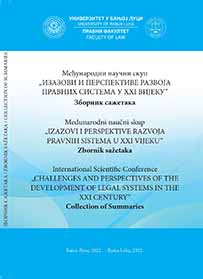NOVE TENDENCIJE U RAZVOJU MEĐUNARODNOG KRIVIČNOG PRAVOSUĐA – DA LI NAM TREBA MEĐUNARODNI ANTIKORUPCIJSKI SUD?
NEW TENDENCIES IN THE DEVELOPMENT OF INTERNATIONAL CRIMINAL JUSTICE – IS AN INTERNATIONAL ANTI-CORRUPTION COURT NEEDED?
Author(s): Filip NovakovićSubject(s): Law, Constitution, Jurisprudence, Criminal Law, International Law, Court case
Published by: Правни факултет Универзитета у Бањој Луци
Keywords: high-level corruption; IACC; kleptocracy; organized crime; economic crime; transnational crime; international justice;
Summary/Abstract: High-level corruption and organized crime associated with the highest holders of public office is a social reality of the modern world. Corruption covers all aspects of social life and appears in all fields. The process of globalization, market liberalization and the opening of borders have led to this negative social phenomenon taking on visible global proportions. The author of the paper wants to present a new and, by all accounts, revolutionary idea in a concise manner: the International Anti-Corruption Court. A new international mechanism for combating high corruption, organized crime and the most serious forms of economic crime that offends two or more sovereignties has become an urgent need in today’s world. High-level corruption depends on a culture of impunity in countries whose leaders will not allow national criminal laws to be enforced against their close colleagues and themselves. The International Anti-Corruption Court would represent a mechanism for the enforcement of international, as well as national, anti-corruption regulations and instruments. It would deal with the issue of punishing corrupt holders of public and judicial functions, businessmen and „professional“ transnational criminals at the international level. The successful prosecution and imprisonment of corrupt politicians would create an opportunity for the democratic process to produce successors dedicated to serving their people, not enriching themselves.
Journal: Зборник радова Међународни научни скуп „Изазови и перспективе развоја правних система у XXI вијеку"
- Issue Year: 2022
- Issue No: 2
- Page Range: 621-631
- Page Count: 11
- Language: Serbian

